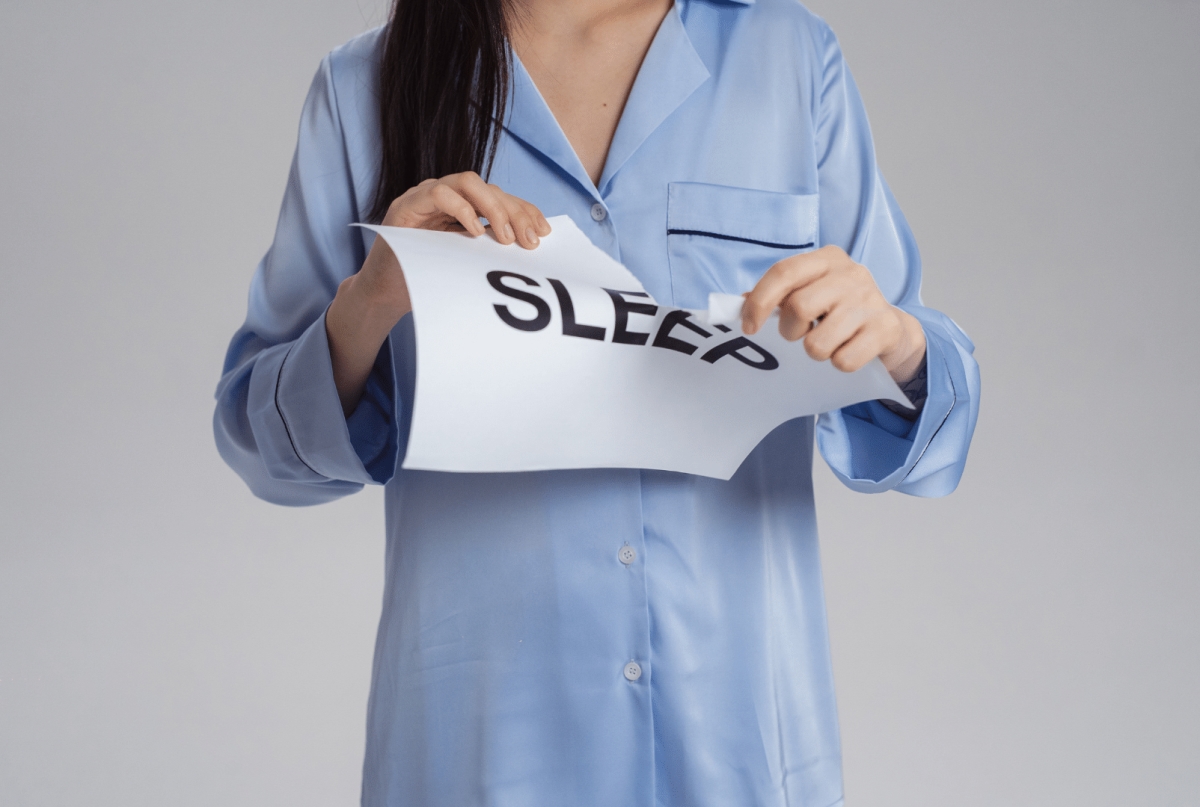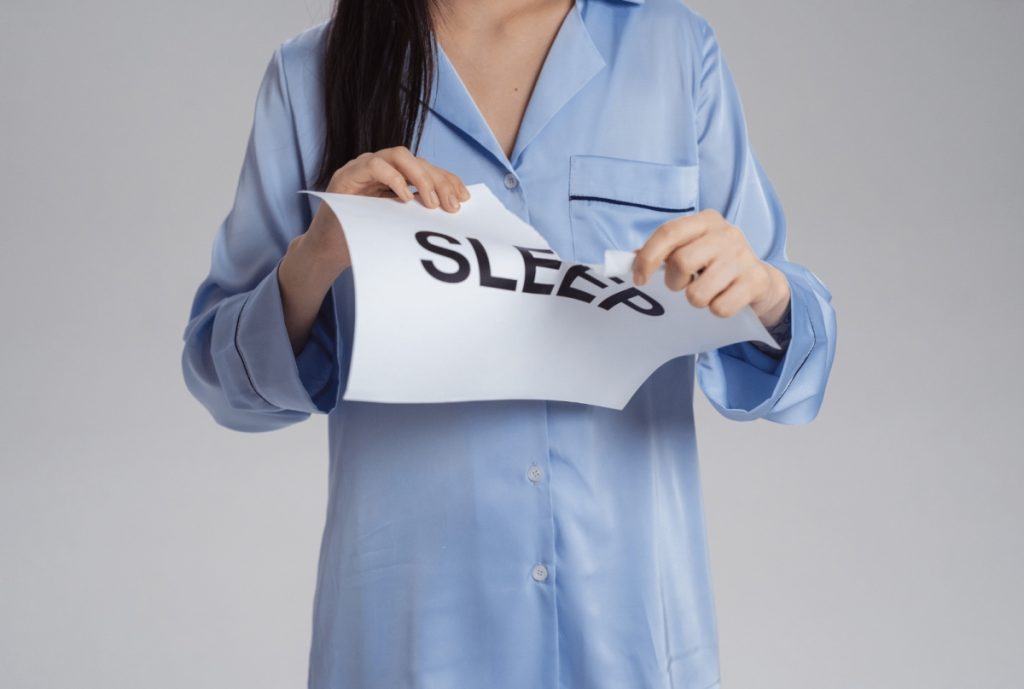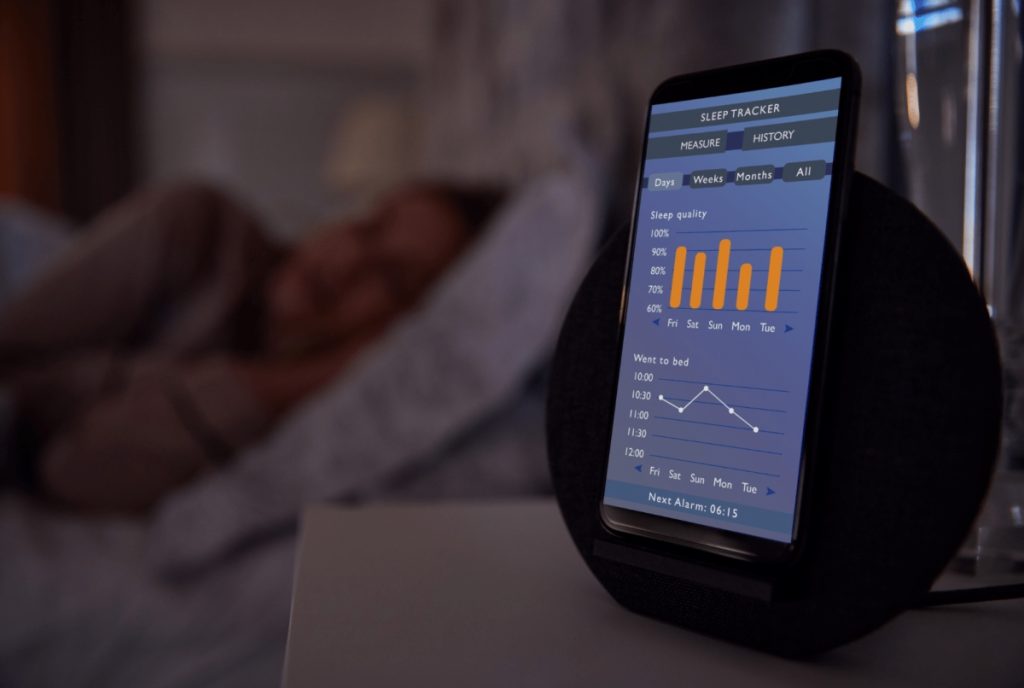
Why Sleep Deprivation Makes You Hungry and Fat


Why Sleep Deprivation Makes You Hungry and Fat
At the foundation of optimal health is quality sleep. On average, we now sleep 6.8 hours a night, declining from 9 hours a century ago, and 30% of adults get less than 6 hours per night. Stress, overthinking, sickness, and poor sleeping habits can all lead to sleep deprivation and seriously undermine your health goals.
What Happens to Your Appetite Regulation Hormones When You’re Sleep-deprived?
Two major hormones control your appetite – leptin and ghrelin.
- Leptin, a hormone from your fat cells, is responsible for signaling your brain when you are full and to stop eating.
- Ghrelin, produced mainly in your stomach and known as the “hunger hormone,” stimulates your appetite.
Sleep deprivation drives up your ghrelin levels and decreases your leptin levels.

When your ghrelin levels increase, your appetite increases, and you seek more rewarding foods like those high in fat, sugar, and carbohydrates. These foods are naturally higher in calories. Just one night of sleep deprivation can result in you eating 300-400 extra calories throughout the next day due to poor food choices.
In a study of nine healthy men, subjects spent three nights at least two weeks apart in a sleep lab. One night consisted of 7 hours, one 4.5 hours, and the third, total sleep deprivation. Compared to the 7-hour night of sleep, after sleeping 4.5 hours, subjects’ ghrelin levels rose slightly, and their appetites increased somewhat. After the night of sleep deprivation, however, participants experienced an intense increase in appetite and their ghrelin levels.
In another study of 12 healthy men, ghrelin levels increased by 28% after two days of a 4-hour sleep restriction compared to two days of 10 hours of sleep. They also craved more calorie-dense foods.
Leptin tells your brain when you’re full and helps maintain energy balance long-term. In a normal healthy individual, leptin levels rise when body fat increases to suppress appetite and encourage weight loss towards your setpoint.
Sleep deprivation decreases your leptin levels. This decrease makes it harder for your brain to get the signal that you feel full and to stop eating.
A study of 1,024 individuals examined the relationship between the amount of sleep, BMI, and hormone levels. Compared to 8 hours of sleep per night, participants with just 5 hours of sleep experienced an over 15% decrease in leptin levels. Participants with lower leptin levels also had higher BMIs that became increasingly higher with shorter amounts of sleep.
By not getting enough sleep or poor-quality sleep, you are setting yourself up for weight loss struggles. Higher ghrelin levels and lower leptin levels leave you with high levels of craving and a drive to eat more unhealthy food.
Effects of Sleep on Metabolism
Before we get into the impact of sleep on your metabolism, we need to make a clear distinction. Not all sleep is created equal. A lot happens during sleep, so you also need to ensure that your sleep is high-quality.
Quantity vs. quality of sleep
In a meta-analysis of two studies, researchers examined the effects of health quantity and quality on health and well-being. All subjects reported between 7-8 hours of sleep nightly and completed health questionnaires to gauge sleep quality. Those who experienced higher quality sleep also experienced better health, mood, and lower feelings of sleepiness.
Signs of poor quality sleep include:
- Taking longer than 20 minutes to fall asleep
- Waking up frequently throughout the night
- Lying awake at night when trying to get back to sleep
- Restlessness
- Daytime sleepiness
Objectively, sleep quality means if you’re able to achieve healthy levels of deep and REM sleep, and with minimal disruption throughout the night. In our experience with devices like Oura ring with ourselves and our clients, deep sleep has the highest impact on feeling refreshed and having the best cognitive function the next day. Deep sleep is also most sensitive to circadian rhythm disruption, inflammation, temperature, and other sleep disruptors.

Sleep deprivation and metabolism
On top of increased hunger and cravings, lack of quality sleep and sleep deprivation disrupt your metabolism thereby creating another barrier to your weight loss and physique goals.
Each night, sleep plays an essential role in stabilizing your metabolism. As part of your normal circadian rhythm, your metabolism drops by about 15% at night. This drop begins to occur during non-REM sleep and seems to allow your body to repair any cell damage that occurred when you were awake and your metabolism was more active.
While your body is rebuilding cells while you sleep, it’s also busy breaking down fats and glucose. As your body breaks down glucose, your glucose levels drop along with insulin. This drop in insulin signals your body to begin burning your energy stores.
Sleep deprivation disrupts glucose metabolism leading to higher levels of glucose and insulin.
In a study of 11 healthy young men, researchers compared the effects of sleep deprivation on carbohydrate metabolism. Subjects were allowed only 4 hours in bed for six nights and then 12 hours for six nights. Sleep deprivation decreased glucose tolerance and impaired insulin response.
When you don’t get enough sleep, and your body cannot take up glucose from the blood very well, your glucose levels will remain high. If your glucose levels are high, your body will continue to release insulin to lower your glucose levels. While your insulin levels are high, it can cause a couple of barriers to weight loss:
- Your body won’t use your fat stores for energy, making it harder to lose weight.
- Insulin levels remaining high can lead to poor blood sugar control and eventually belly fat and weight gain.
In addition to the impairment in fat and glucose metabolism, sleep deprivation decreases your resting metabolic rate (RMR), or the number of calories your body burns at rest.
A study of 47 healthy adults explored the effects of sleep deprivation on energy expenditure. 36 participants slept 4 hours, and 11 slept 10 hours for five nights. While there were no changes in the control group on RMR, the sleep-deprived group experienced a 2.6% loss in RMR.
A decreased RMR can lead to weight gain and has been identified as a risk factor for obesity.
Sleep Deprivation and Body Composition
Your sleep quality can also affect whether your body burns fat or muscle mass. When you don’t get enough sleep, you not only get fatter but also lose muscle and bone mass.
Increased body fat
In a study of 10 overweight individuals, subjects underwent a caloric restriction and got either 5.5 hours or 8.5 hours of sleep for 14 days. Those with reduced sleep lost 55% less weight even with the same calorie restriction. Therefore, sleep deprivation can curtail your weight loss efforts and result in you gaining more fat.
In another study of 12 healthy non-obese individuals, participants experienced a 14-day sleep restriction of 4 hours of sleep opportunity compared to a control group. Sleep deprivation led to significant weight gain and particularly abdominal fat.
The weight gain demonstrated in the above studies can be explained by the shift in appetite hormones and disrupted metabolism. Lower leptin levels encourage your body to hold onto and increase body fat, while insulin disruption can lead to longer-term issues and belly and liver fat.

Muscle recovery and protein synthesis
Sleep plays a vital role in muscle recovery, and thus muscle building in response to diet and exercise. As you rest, your muscles receive an increased blood supply and nourishment from nutrients and oxygen. During non-REM (deep) sleep, part of your body’s restoration process includes the release of human growth hormone (HGH) and increasing protein synthesis to build and repair muscles.
When you are sleep deprived, you spend less time in non-REM sleep. This results in a decline in HGH secretion and reduced time for protein synthesis.
In a study of 7 males and 5 females, researchers sought to determine the effects of sleep deprivation on protein synthesis. All subjects experienced one night of total sleep deprivation and one night of normal sleep. The results were clear. Just one night of sleep deprivation was detrimental to muscle growth as evidenced by:
- Reduced muscle synthesis by 18%
- Higher levels of catabolic (muscle destroying) hormones such as cortisol
- Lower levels of anabolic (muscle building) hormones such as testosterone and insulin growth factor-1 (IGF-1)
A reduction in HGH and testosterone not only causes reduced muscle but also reduced fat burning and overall wellbeing. When you aren’t getting enough sleep, you burn lean tissue more than fatty tissue and seriously undermine your fitness goals.
Bone mass
While the adverse effects of sleep deprivation on muscle mass are well-studied areas, a newer area of discovery is the effect on your bones. Not getting enough sleep can result in lower bone density putting you at increased risk of fractures and osteoporosis. This is of particular concern to postmenopausal women.
A recent meta-analysis of studies examined the relationship between sleep and bone health.
Some of the significant findings include:
- Shorter sleep (5 hours) results in decreased bone mineral density (BMD) and increased bone fracture risk.
- Shorter sleep results in a reduction of IGF-1, reducing bone formation.
- Getting too much sleep (more than 8 hours, including naps) over the age of 40 can also decrease BMD.
- Lower sleep quality is consistently linked with low BMD and increased risk of osteopenia.
Bone metabolism, which occurs when you sleep, is a continuous process of breaking down bone and regrowing it. Scientists believe sleep deprivation disrupts the bone growth that occurs while you sleep. This increases bone resorption, or destruction of the bone tissue, while minimizing bone regrowth.
Young or old, it’s important to ensure proper bone formation and growth and prevent fracture risk as you age.
The Takeaway
If you are on a journey to optimal health, performance, and aesthetics, make sure you set a solid foundation. Getting good sleep every night is essential for achieving and maintaining weight loss and physique goals. You should start by:
- Allocating time for 7-8 hours of sleep every night
- If you can’t seem to wake up refreshed or are always tired, speak to your doctor about getting a sleep study to rule out sleep disorders. If you’re diagnosed with a sleep disorder, then follow through with the prescribed treatment.
- Learning more about how to overcome sleep deprivation
- Maximizing your sleep quality with sleep routines and high-quality sleep supplements like Sleep Breakthrough
References
- Sharma S, Kavuru M. Sleep and metabolism: an overview. Int J Endocrinol. 2010;2010:1-12. doi:10.1155/2010/270832
- Lin J, Jiang Y, Wang G, et al. Associations of short sleep duration with appetite-regulating hormones and adipokines: A systematic review and meta-analysis. Obes Rev. 2020;21(11):e13051. doi:10.1111/obr.13051
- Skibicka KP, Dickson SL. Ghrelin and food reward: the story of potential underlying substrates. Peptides. 2011;32(11):2265-2273. doi:10.1016/j.peptides.2011.05.016
- Papatriantafyllou E, Efthymiou D, Zoumbaneas E, Popescu CA, Vassilopoulou E. Sleep deprivation: Effects on weight loss and weight loss maintenance. Nutrients. 2022;14(8):1549. doi:10.3390/nu14081549
- Schmid SM, Hallschmid M, Jauch-Chara K, Born J, Schultes B. A single night of sleep deprivation increases ghrelin levels and feelings of hunger in normal-weight healthy men. J Sleep Res. 2008;17(3):331-334. doi:10.1111/j.1365-2869.2008.00662.x
- Spiegel K, Tasali E, Penev P, Van Cauter E. Brief communication: Sleep curtailment in healthy young men is associated with decreased leptin levels, elevated ghrelin levels, and increased hunger and appetite. Ann Intern Med. 2004;141(11):846-850. doi:10.7326/0003-4819-141-11-200412070-00008
- Rosenbaum M, Leibel RL. 20 years of leptin: role of leptin in energy homeostasis in humans. J Endocrinol. 2014;223(1):T83-96. doi:10.1530/JOE-14-0358
- Taheri S, Lin L, Austin D, Young T, Mignot E. Short sleep duration is associated with reduced leptin, elevated ghrelin, and increased body mass index. PLoS Med. 2004;1(3):e62. doi:10.1371/journal.pmed.0010062
- Pilcher JJ, Ginter DR, Sadowsky B. Sleep quality versus sleep quantity: relationships between sleep and measures of health, well-being and sleepiness in college students. J Psychosom Res. 1997;42(6):583-596. doi:10.1016/s0022-3999(97)00004-4
- Kohyama J. Which is more important for health: Sleep quantity or sleep quality? Children (Basel). 2021;8(7):542. doi:10.3390/children8070542
- Spiegel K, Leproult R, Van Cauter E. Impact of sleep debt on metabolic and endocrine function. Lancet. 1999;354(9188):1435-1439. doi:10.1016/S0140-6736(99)01376-8
- Spaeth AM, Dinges DF, Goel N. Resting metabolic rate varies by race and by sleep duration. Obesity (Silver Spring). 2015;23(12):2349-2356. doi:10.1002/oby.21198
- Ravussin E. Low resting metabolic rate as a risk factor for weight gain: role of the sympathetic nervous system. Int J Obes Relat Metab Disord. 1995;19 Suppl 7:S8-S9. Accessed December 17, 2022. https://pubmed.ncbi.nlm.nih.gov/8963370/
- Nedeltcheva AV, Kilkus JM, Imperial J, Schoeller DA, Penev PD. Insufficient sleep undermines dietary efforts to reduce adiposity. Ann Intern Med. 2010;153(7):435-441. doi:10.7326/0003-4819-153-7-201010050-00006
- Covassin N, Singh P, McCrady-Spitzer SK, et al. Effects of experimental Sleep Restriction on energy intake, energy expenditure, and visceral obesity. J Am Coll Cardiol. 2022;79(13):1254-1265. doi:10.1016/j.jacc.2022.01.038
- Verkouter I, Noordam R, le Cessie S, et al. The association between adult weight gain and insulin resistance at middle age: Mediation by visceral fat and liver fat. J Clin Med. 2019;8(10):1559. doi:10.3390/jcm8101559
- Van Cauter E, Plat L. Physiology of growth hormone secretion during sleep. J Pediatr. 1996;128(5 Pt 2):S32-7. doi:10.1016/s0022-3476(96)70008-2
- Jarmasz JS, Jin Y, Vakili H, Cattini PA. Sleep deprivation and diet affect human GH gene expression in transgenic mice in vivo. Endocr Connect. 2020;9(12):1135-1147. doi:10.1530/EC-20-0354
- Lamon S, Morabito A, Arentson-Lantz E, et al. The effect of acute sleep deprivation on skeletal muscle protein synthesis and the hormonal environment. Physiol Rep. 2021;9(1):e14660. doi:10.14814/phy2.14660
- Traish AM. Testosterone and weight loss: the evidence: The evidence. Curr Opin Endocrinol Diabetes Obes. 2014;21(5):313-322. doi:10.1097/MED.0000000000000086
- Kim KR, Nam SY, Song YD, Lim SK, Lee HC, Huh KB. Low-dose growth hormone treatment with diet restriction accelerates body fat loss, exerts anabolic effect and improves growth hormone secretory dysfunction in obese adults. Horm Res. 1999;51(2):78-84. doi:10.1159/000023319
- Kim A, McDonald M, Girgis C. The relationship between sleep and bone: Strange bedfellows? Curr Opin Endocr Metab Res. 2021;18:236-242. doi:10.1016/j.coemr.2021.04.003
- Hirshkowitz M, Whiton K, Albert SM, et al. National Sleep Foundation’s sleep time duration recommendations: methodology and results summary. Sleep Health. 2015;1(1):40-43. doi:10.1016/j.sleh.2014.12.010
1 Comments
Leave a Comment
You must be logged in to post a comment.

Hello! I just would like to give a huge thumbs up for the great info you have here on this post. I will be coming back to your blog for more soon.